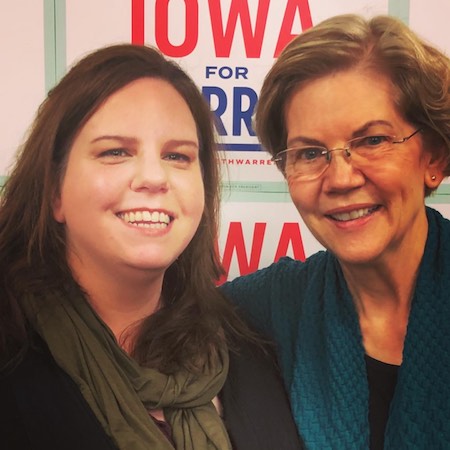Heather Strachan is a mental health professional, criminal justice reform advocate, and a former rural organizer for Barack Obama’s 2008 campaign. -promoted by Laura Belin
Throughout caucus season I have fielded questions from advocates and professionals alike asking why mental health has gone largely ignored in the presidential race. All eyes are on Iowa at a time when we have reached the bottom of the pile in terms of the number of available beds, the number of psychiatric providers per capita, and the availability of community-based services. One in five Iowans will experience mental illness in their lifetimes, and this has far-reaching effects throughout families and entire communities, including my own.
The candidates are not solely to blame: the media are mostly not asking the question.
But Elizabeth Warren has shown her willingness to both ask the question and answer it. It did not go unnoticed that Warren was the only person to mention mental health during the last Democratic debate. And she backs this up with a history of getting things done–which is why I have chosen to caucus for Elizabeth Warren on Monday night.
Mental health is the defining public health crisis of our time. Mental illness is one of the fastest rising causes of disability and homelessness; jails and prisons have become our largest mental health providers, and people living with mental illness die 25 to 30 years sooner than those without. In addition, people of color routinely lack access to care, particularly for mental health, and representation among providers and therapists is low throughout the US. Simply put: Elizabeth Warren knows we cannot fix our healthcare system without prioritizing mental health.
Warren understands that even Medicare for All (or the alternatives) will not solve the mental health crisis in our country. Simply addressing coverage and medication costs will not help if services and providers do not exist in people’s communities. As a cancer survivor, I can be reasonably assured that I will be seen by an appropriate specialist and have community resources at my disposal to assist through my treatment. No such assurances exist for people with mental illness, particularly in the midst of a crisis, which can be just as deadly. And we have been in the midst of a crisis for at least the last five years.
Eighty-nine of Iowa’s 99 counties are federally designated as mental health professional shortage areas by the Health Resources and Services Administration, and at the current rates of graduation and training, it would take decades for us to catch up to the number of psychiatric providers recommended per capita. In addition, funding for new evidence-based services and innovation in treatment is relatively non-existent considering mental illnesses can affect at least 20 percent of the population.
As a supporter of Medicare for All, I understand that parity for mental health will still be incomplete, unless we restructure how we fund services, research, and implementation, with mental health equity as a central goal. Elizabeth Warren knows we also need to create a no-wrong-door culture in healthcare; that our physicians need training in mental health, regardless of specialty, and we must integrate physical and mental healthcare especially through our community health centers, community mental health centers, and integrated health homes. Reimbursement rates for mental health services must also rise in order to recruit a high-quality mental health workforce at all levels of care.
Elizabeth Warren is the one candidate who time and again has shown she truly understands how policies will affect the people impacted the most. And in creating those policies, she is committed to listening to and learning from those who live with mental illness themselves, as well as the families. She has an impressive knowledge of the systems already in place, and how to build on the work they are doing to address the needs.
America needs a leader who will declare a mental health moonshot. Elizabeth Warren’s big structural change is that moonshot, backed up by sound policy, and the ability to make change on day one.
Editor’s note: Heather Strachan is grants administrator for the National Alliance on Mental Illness (NAMI) in Iowa, but this commentary reflects her personal opinions only. NAMI Iowa does not endorse any political party or candidates for public office.
Top photo of Heather Strachan with Elizabeth Warren provided by the author and published with permission.

